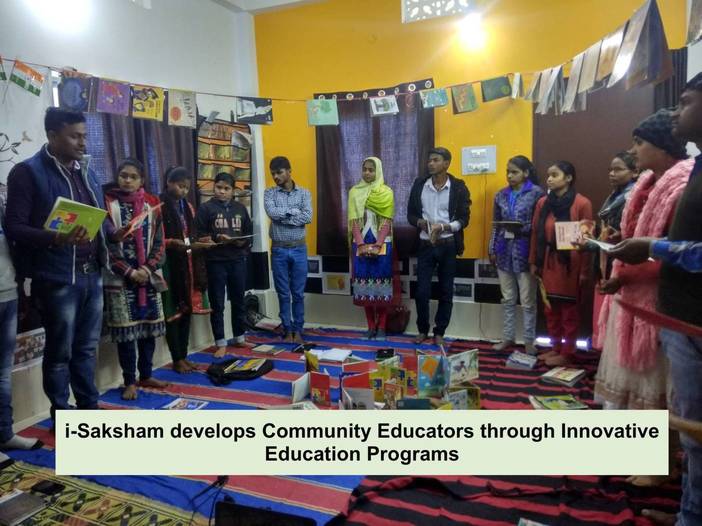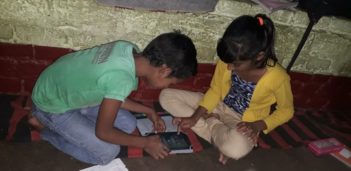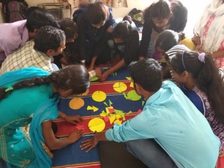According to the Annual Status Of Education Report (ASER – Rural) 2018, one in two students (50.3%) in Indian schools lack basic reading ability not just of their own grade but also of those of three levels below.
The right to education not only involves the right to access education but also the right to receive quality education. However, a large portion of rural students in India are deprived of this basic right due to various constraints like socioeconomic reasons, financial ability and accessibility. Also, many of these students are forced to quit education and take up small jobs to make both ends meet. To transform a vast majority of disadvantaged students, there is a compelling need to create more innovative education models. Fortunately, Jamui and Munger districts of Bihar have seen positive changes in enabling education for the socially deprived and underprivileged children, thanks to i-Saksham.
Realizing the social imperative, three passionate individuals came together and founded i-Saksham, a not-for-profit organisation which aims at providing quality education to children in remote and unreached areas. Through their venture, social entrepreneurs, Ravi Dhanuka, Shravan Jha and Aditya Tyagi are challenging the existing educational system where only a handful of privileged students are able to achieve their dreams. i-Saksham’s Community Education Model embraces education, digital literacy, awareness about socioeconomic issues and vocational skills as core tools to bring capabilities to individuals and societies.

i-Saksham’s resolve to empower community educators
Elaborating on the goals and their vision, Ravi Dhanuka, Co-founder and Director (Operations) of i-Saksham, says the key focus is to create community educators by offering quality education to rural students. Emphasizing on this aspect, he says, “there have been improvements and innovations in the way we learn, however that has been limited to urban India, leaving a huge quality and opportunity deficit at unreached rural areas. i-Saksham acknowledges the need and urgency to bridge this gap and quality learning at door steps of people residing in the most backward areas of the country. Our mission is to build Community Edu-leaders to enrich education experiences of underserved children for their lifelong success in the world ahead.”
i-Saksham provides a 3 months training course for youth in Community Leadership. The course, which is affiliated to NSDC, covers the pedagogical principles of community leadership. They also provide a fellowship program which is aimed at motivating young people to go for higher education. Their primary goal is to train students to become Community Tutors and Entrepreneurs.
 Looking back at the formation of i-Saksham during a PMRDF fellowship program where all the founders met for the first time, Ravi revisits the initial days.“I got an opportunity to join the PMRDF fellowship program which was launched by the Ministry of Rural Development. The idea of the program was to support the district collectors in various districts. It primarily focused on the professional and managerial implementation of poverty alleviation programs for backward communities. I got placed in Bihar in 2011 for the implementation of the rural development programs. It was an interesting journey to work with the government and various other organizations. Having worked in rural areas, I became more familiar with the status of education in those areas.” He goes on to describe how there was none or minimal infrastructure for the students and the quality of education was also not upto the mark. This inspired him to do something innovative in the education space for youth development.
Looking back at the formation of i-Saksham during a PMRDF fellowship program where all the founders met for the first time, Ravi revisits the initial days.“I got an opportunity to join the PMRDF fellowship program which was launched by the Ministry of Rural Development. The idea of the program was to support the district collectors in various districts. It primarily focused on the professional and managerial implementation of poverty alleviation programs for backward communities. I got placed in Bihar in 2011 for the implementation of the rural development programs. It was an interesting journey to work with the government and various other organizations. Having worked in rural areas, I became more familiar with the status of education in those areas.” He goes on to describe how there was none or minimal infrastructure for the students and the quality of education was also not upto the mark. This inspired him to do something innovative in the education space for youth development.
 “NSDA which is under the MSDE, has launched an initiative. During that time,I along with my Co-founders presented our i-Saksham model. It became one among the top 5 proposals in the skill development area. We were able to partner with NSDC. Our fellowship got over in 2015 and we started working for i-Saksham model on a full-time basis.” Ravi Dhanuka on how they partnered NSDC.
“NSDA which is under the MSDE, has launched an initiative. During that time,I along with my Co-founders presented our i-Saksham model. It became one among the top 5 proposals in the skill development area. We were able to partner with NSDC. Our fellowship got over in 2015 and we started working for i-Saksham model on a full-time basis.” Ravi Dhanuka on how they partnered NSDC.
In rural areas, most of the students who pass 12th class, aspire to grab a government job without any focus on developing their skills. Prior to the formation of i-Saksham, the founders have started many initiatives for the development of the students. They have conducted skills training programs, corporate job fairs etc. However, even after many initiatives, they found that it is not at all helping the youth in any ways. They still wished for government jobs that were hard to find.
“We understood that there is a need to change the students’ mindsets through innovative skilling programs. We wanted to skill the youth, but not for usual jobs such as plumbing . Our objective was to provide quality education and make them future educators,” says Ravi, while sharing his dream for holistic education that includes vocational skills.
 How i-Saksham’s model education and practical experience through skills
How i-Saksham’s model education and practical experience through skills
The primary aim of the education model from i-Saksham is to create quality teachers in the villages who could teach the children from their own community. The initiative enables young people to generate income from their own community. Also, if the young educators want to do higher education, the organization will mentor and coach them. Their goal is to integrate education and experience in the larger framework of skills development.
“Through our program, we provide an access to quality education for people in remote areas. Our program improves the learning outcomes of students and they become efficient. This creates a hope in the parents’ minds and they are so happy. Also, many young people are willing to become educators. It gives us immense pleasure to realize that teaching has become an aspirational path for them,” states Ravi.
With the incubation support from UnLtd India, i-Saksham has become a pioneer in creating Community Educators. They aim at attaining the first milestone of providing quality elementary education to 5 million poor children, skilling 50,000 youth to be community tutors and skilling 5,00,000 youth in various vocational trades by 2025.
















